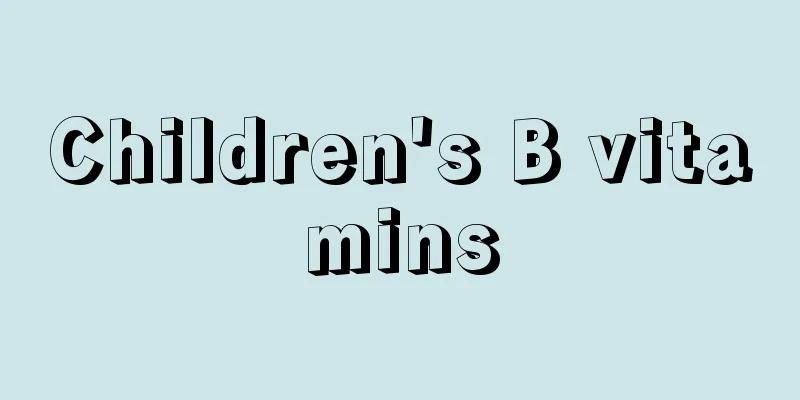Children's B vitamins

|
Vitamins are essential trace elements for the human body. There are many types, the most common ones are vitamin A, B, C, E, etc. Vitamin B is the general term for B vitamins, which can be further divided into many types, each with different functions. As children grow, they have a great demand for various vitamins. If children are slightly deficient in B vitamins, it will often have a greater impact on their health. Vitamin B includes vitamin B1, vitamin B2, vitamin B6, vitamin B12, niacin, pantothenic acid, folic acid, etc. B vitamins are essential substances for promoting metabolism in the body and converting sugar, fat, protein, etc. into calories. If vitamin B is lacking, cell function will immediately decrease, causing metabolic disorders, and the body will experience sluggishness and loss of appetite. On the contrary, liver damage caused by excessive drinking is often associated with vitamin B deficiency. Supplementing with B vitamins can relieve mood. Vitamin B1: also known as anti-neuritis factor, helps improve beriberi and shingles; the more calories we consume, the more B1 we need, because it helps digest carbohydrates and thus provides us with sufficient energy. B1 also helps improve mental state, and people who are often under mental stress especially need it. Vitamin B2: Also known as riboflavin, it helps eliminate inflammation of the mouth, lips, and tongue; promotes normal growth of hair, skin, and nails; together with B6, it also helps relieve fatigue and refresh the mind. Vitamin B3: also known as niacin, helps promote digestive health, improve gastrointestinal dysfunction and diarrhea; helps lower blood cholesterol and triglyceride levels; is also used medically to improve stomatitis and prevent bad breath. Vitamin B5: Also known as pantothenic acid and the stress-fighting vitamin, it helps in the production of adrenaline (a hormone that helps the body cope with emergencies), thus effectively relieving stress and fatigue. When taken together with vitamin C, pantothenic acid can also help maintain skin vitality and speed up wound healing. Vitamin B6: Also known as pyridoxine, vitamin B6 plays a regulatory role in the metabolism of protein. It helps in the production of energy and makes people feel energetic. It is known as a refreshing nutrient. B6 deficiency is often accompanied by deficiencies in other B vitamins. Its symptoms are similar to those of B2 deficiency and are also a manifestation of some inflammations. Children may be more affected, with symptoms such as irritability, muscle cramps, and convulsions. Vitamin B9: also known as folic acid is an important vitamin that, together with B12, helps in the formation of red blood cells and reduces anemia. Folic acid deficiency in pregnant women can cause spina bifida and anencephaly in the fetus. In addition, folic acid helps maintain normal blood homocysteine levels (an important indicator for measuring heart disease) and reduces the occurrence of heart disease. Vitamin B12: also known as cobalamin, it can promote the formation and regeneration of red blood cells and reduce pernicious anemia; it can eliminate irritability, help concentrate and enhance memory; it helps children's growth and development and increases appetite. |
<<: Baby always scratches his head and face when sleeping
>>: Symptoms of vitamin deficiency in children
Recommend
What is the best way to treat rectal polyps in children?
Are rectal polyps the only treatment options avai...
Treatment of baby's pharyngeal congestion
In the new life, everyone pays attention to scien...
What should I do if my child has prickly heat on his forehead?
Children often suffer from various diseases becau...
What to do if your baby has milk accumulation
Some babies have been fed half breast milk and ha...
What is the appropriate water temperature for children's bath?
It is said that children are the apple of their p...
What's wrong with my baby's runny nose and cough?
Babies can’t tell us when they are sick, nor can ...
What is the correct method for children's vision correction?
Many people believe that children's eyesight ...
What should I do if my child has blocked nose?
Stuffy nasal cavity is a common disease for child...
Can baby teeth grow back if they fall out?
Deciduous teeth are the teeth that grow in the ea...
What to do if your baby has a high fever due to bacterial infection
Bacteria are microorganisms that can penetrate an...
What's the matter with the baby's ear rot?
As babies continue to grow, they are prone to som...
How to treat congenital heart disease in children
Congenital heart disease in children is a type of...
Will the baby have a fever if he uses a fan?
Fans are electrical appliances found in many hous...
Exercise therapy for children to enhance immunity
The strength of a person's immunity directly ...
What to do if a four-year-old is constipated
Many babies don’t like to drink water and eat lit...









